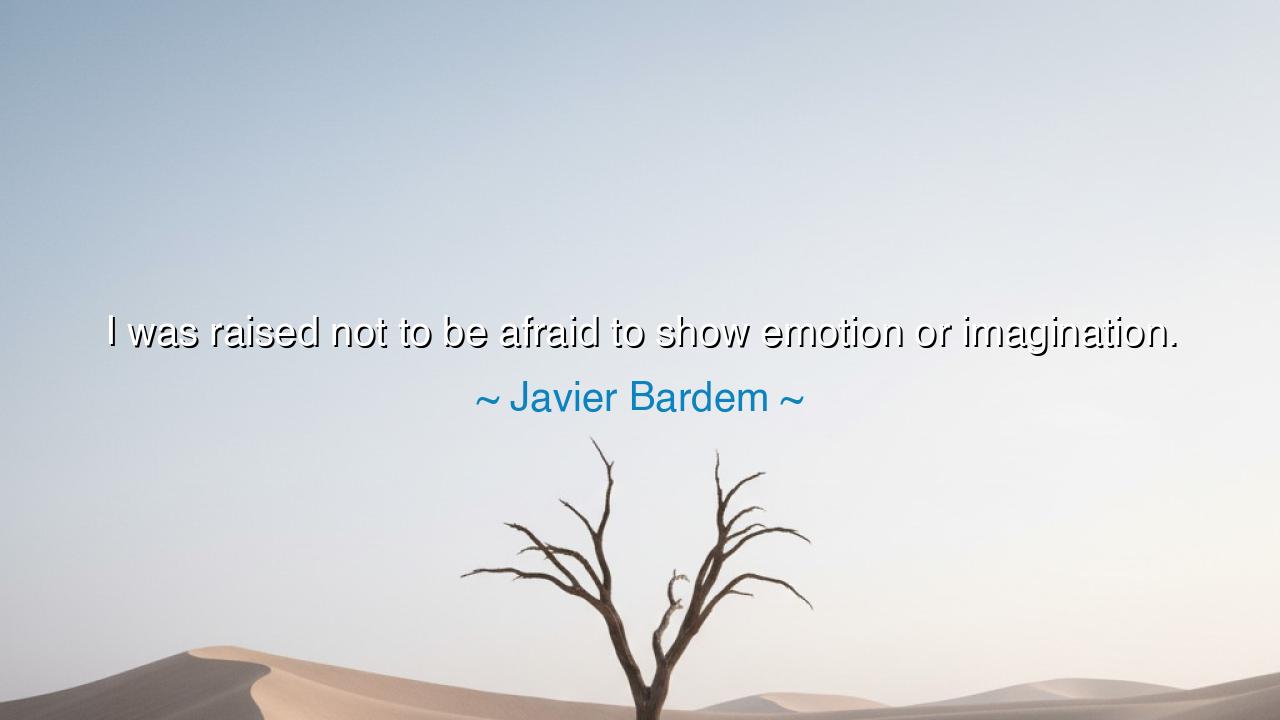
I was raised not to be afraid to show emotion or imagination.






"I was raised not to be afraid to show emotion or imagination." These words, spoken by the great actor Javier Bardem, carry a powerful lesson on the importance of embracing both emotion and imagination as essential parts of the human experience. Bardem, through his upbringing, learned the value of not shying away from the depths of his feelings or the expanses of his mind. In a world that often encourages restraint, stoicism, and the suppression of personal expression, Bardem’s words remind us that emotion and imagination are not weaknesses to be hidden, but strengths to be celebrated and expressed.
In the days of the ancients, great thinkers and creators like Homer and Sophocles understood the profound importance of emotion in storytelling. The Greek tragedies were built upon the foundation of human emotion—love, revenge, sacrifice, and betrayal—and were designed to bring these feelings to the forefront of the human experience. The audiences were not merely spectators; they were invited to feel deeply, to be moved to the core of their being. The great tragedies were meant to purify, to inspire, and to elevate through the emotion they stirred. This ability to express and experience emotion was seen as a fundamental part of being human, a source of both strength and wisdom.
Consider the mighty Achilles, whose rage in the Iliad is not only a defining trait but a source of great drama and insight. His emotions—his love for his comrades and his hatred for his enemies—define the course of his story. Without the full expression of his emotions, Achilles would not have been the hero we know today. His actions, though fueled by emotion, were woven with imagination, creating a tapestry of heroism that resonated with those who witnessed it. To suppress such emotions, to hide from them, would be to deny the essence of the human condition. Bardem’s message echoes this ancient wisdom—our emotions are a part of us that must not be denied or repressed, for they are the very force that drives us forward, that fuels our actions.
Similarly, imagination—that mighty power that allows us to transcend the limitations of our immediate surroundings and reach into the world of the unseen—is just as vital. In the works of the great philosophers, like Plato, imagination was not merely a fanciful tool but a bridge to higher understanding. Plato spoke of the realm of forms, where the mind could reach the ideal, the perfect version of truth. For Plato, imagination was a necessary component of knowledge, for it allowed one to see beyond what was immediately visible and to grasp the deeper, more profound truths that underlie reality. Bardem’s upbringing, which encouraged the full expression of both emotion and imagination, aligns with this philosophy: to embrace these faculties is to embrace a fuller, richer version of life.
The world around us, too, has often sought to stifle emotion and imagination in favor of cold reason and restraint. Think of the many periods in history where emotion was seen as weakness or where creative thinking was crushed under the weight of conformity. During the Enlightenment, for example, the rational mind was elevated above all else, and the arts, driven by emotion and imagination, were sometimes viewed as frivolous distractions. Yet even in the midst of such intellectual rigor, artists like William Blake and Mary Shelley defied this narrow vision, bringing forth works that were rich with emotion, imagination, and visions of worlds unknown. In these works, the heart and mind were not separate but intertwined, showing that the greatest achievements come from the fusion of both reason and the wild freedom of imagination.
In the modern world, the value of emotion and imagination cannot be overstated. Bardem, as an actor, embodies these traits by taking on roles that require deep emotional vulnerability and expansive imagination. Whether playing a villain or a hero, he taps into the full spectrum of human experience, understanding that the audience connects not just with the plot, but with the emotions that fuel the story. His work reminds us that to live fully, we must be willing to confront and express our deepest emotions, and to dream beyond the ordinary into the realm of what could be.
The lesson we learn from Bardem’s words is not just for actors or artists—it is for all of us. We are all called to embrace the emotions that shape our lives and the imagination that fuels our aspirations. Do not hide from your feelings, for they are your guiding lights in times of uncertainty. Do not suppress your dreams, for they are the vision that will lead you to a future you cannot yet see. The world may tell you to be cautious, to restrain your passions, to play it safe. But true strength comes from embracing both the heart and the mind, from weaving together emotion and imagination into the fabric of your life.
So, let us go forward with the courage to show our emotions, to let our imagination roam free, and to share our full selves with the world. Like the great thinkers and creators before us, let us not be afraid to live fully, to dream big, and to express the deepest parts of our human nature. For it is in this expression that we find not only our own purpose but the power to inspire and transform the world around us.






AAdministratorAdministrator
Welcome, honored guests. Please leave a comment, we will respond soon